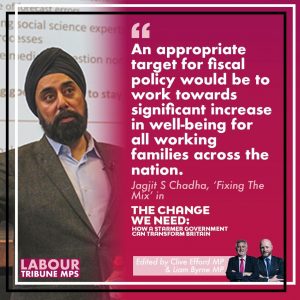Massive growth in foodbank demand over the past decade has been one of the most shameful impacts of Tory rule. It has paralleled the roll-out of Universal Credit, which was announced shortly after the 2010 General Election. There is an indelible link between the two. That is a major part of the reason for our Party committing to replace Universal Credit.
Its important to learn the right lessons from what has gone wrong. The principle of merging half a dozen different benefits is sensible. Simplifying the system for claimants is good – in particular, making it easier for unemployed people to work out their financial position if they were to start working. Nobody I know wants a return to Jobseekers Allowance and Income Support.
The system to run Universal Credit, which DWP commissioned from major IT suppliers in 2010, had to be scrapped after a couple of years work. The current system was developed from scratch in-house. It has done a remarkable job during the pandemic, getting urgent help to millions when lockdown began. Up to 100,000 new Universal Credit claims per day were handled efficiently. It was an impressive achievement.
The problem is with what the system is being asked to do. It is shameful that – amidst surging food and fuel costs, and the pandemic not yet over – Ministers are taking £20 per week away from the hardest-up families in the country. Support for unemployed families will be at the lowest level, in real terms, since Margaret Thatcher was Prime Minister. In the thirty years since then, the economy has grown by 50% in real terms. But Ministers have decided that unemployment support should be no higher at all.
As a proportion of average earnings, it will be the lowest since the modern welfare state was introduced in 1948. In fact, according to the House of Commons Library, without the £20 per week uplift, unemployment support will be lower as a proportion of average earnings than it was when unemployment benefit was first introduced in 1911.
Social security has a job to do. It cannot do it if it is constantly being raided by Ministers to plug gaps in Government funding elsewhere. You can’t focus on getting a job if you are worrying about how to buy your children’s next meal. Gordon Brown has pointed out that the cut will mean that “the last line of support for families will not be the welfare state, but food banks”.
40% of Universal Credit claimants are in work. Working parents on Universal Credit have told the Select Committee how hard losing £86 per week from their income will be.
There are numerous technical glitches with Universal Credit. A recent Child Poverty Action Group report has pointed out that the system does not implement the law correctly. For example, it is impossible to claim Universal Credit without a National Insurance number, even though the law says you are entitled to. I am increasingly worried about problems with the Real Time Information on wages, provided by HMRC to DWP to calculate Universal Credit entitlements.
But by far the biggest problem with Universal Credit is the five week gap between making a claim and receiving the first regular payment. This is – more than anything else – the feature which is forcing claimants into debt and rent arrears.
When challenged, Ministers say nobody has to wait five weeks, as you can apply for an advance to tide you over the wait. But the advance has to be repaid. It gets deducted from subsequent benefit payments – already low, and, once the uplift is removed, even lower – over the following couple of years. Too often, the result is a downward spiral of rent arrears, debt and payday loans. If your only income is Universal Credit, the spiral is hard to get out of. The Trussell Trust reports that, very often, this is what forces people to a foodbank.
For decades, applying for benefit involved filling in a form in biro, and the form being taken by van to a disused army dept outside Blackpool. People received their first benefit payment within ten days. Now, after spending several hundred million pounds on technology which we were always assured was “agile”, it takes five weeks.
Last October, in its report on “Universal Credit: the wait for a first payment”, the all-party Select Committee called for new applicants to receive an upfront, non-repayable “starter payment” equivalent to three weeks of the standard allowance, to help tide them over those first weeks.
Radical change is needed. The IT system we now have must be re-programmed to provide an adequate social security safety net. And a new Government must take the steps that are required.
Stephen Timms is the Labour MP for East Ham and Chair of the Work and Pensions Select Committee.





